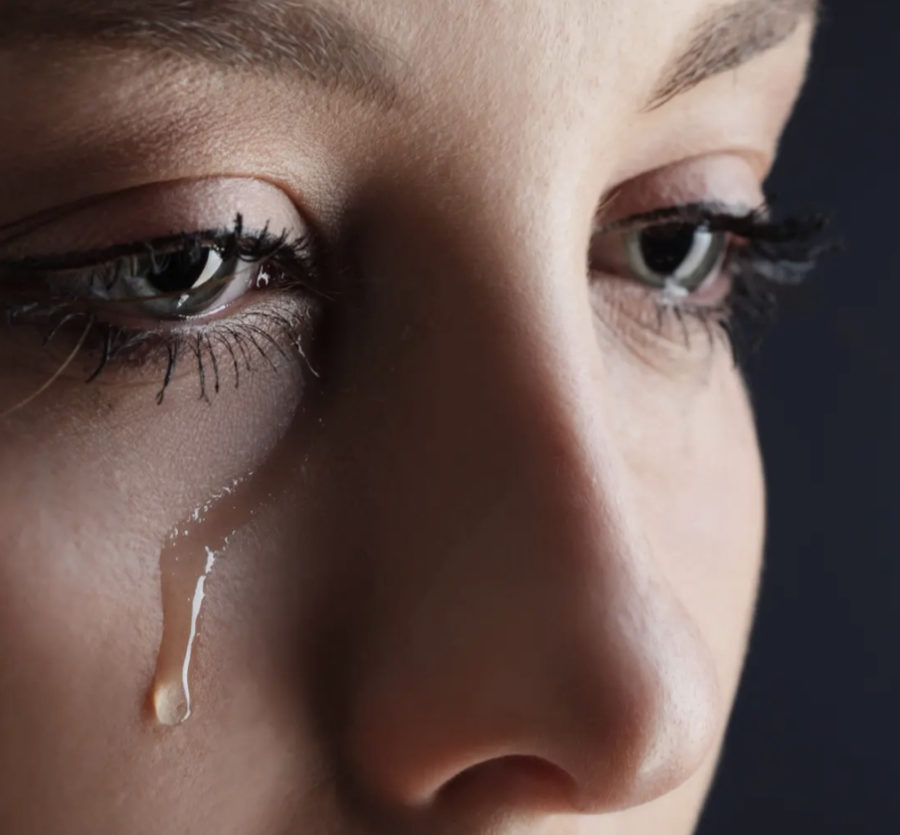Crying: 1% Water and 99% Emotion
Crying is a sign of humanity and vulnerability, and the only relation it has to weakness is that it is the exact opposite.
May 17, 2022
Crying, or as some like to call it, “having something in your eye,” is something we as high school students have probably experienced. Between the stress of homework, extracurriculars, and social life, it is fair to say that the week is not complete without at least two mental breakdowns. However, it is important to note that not everyone expresses their feelings through tears. Some people might not even be able to remember the last time they cried while others may start tearing up after watching a dog commercial. You might be surprised to know (hopefully not so surprised you start crying), that the tears running down your face do more than make you dehydrated. The benefits might just make you want to start crying more.
You probably have that one friend (or maybe you are that friend) who just does not cry. No matter how sad of a movie they watch or how stress-inducing school is, they cannot seem to produce tears. So, why is it that some people’s eyes seem to be going through a drought while others have an endless water supply? Are they just vampires with a switch to turn off their humanity? On the contrary, they are still people with emotions, however, they are possibly less in touch with their feelings. If you find yourself unable to cry, perhaps ask yourself if you tend to bottle up your feelings.
Another explanation is that society often gives crying a bad reputation, characterizing it as a sign of immaturity and childlike behavior. Many people grow up with this societal pressure and the notion that crying is weak. Phrases such as “men don’t cry” and “man up” only add to people’s inability to cry in the future. There is a clear correlation between the use of these phrases and the statistics. Women cry 60% more than men, and experts believe the negative stigma in addition to men having smaller tear ducts and less prolactin, a hormone that promotes tears, is why (webmd.com).
These negative views on crying could not be further from the truth. Crying is a sign of strength. It is what makes us human. What can be stronger than having the courage to be vulnerable?
Many complain that all crying does is leave you with red eyes and a runny nose, but that is a small price to pay for the benefits that come with it. Studies have shown that crying actually reduces stress. Tears contain many stress hormones, which is why you might feel calmer, think more rationally, and be in a better mood after a good cry (medicalnewstoday.com). Crying is literally meant to heal your mind and body, so why purposefully stop something that is natural? Instead of trying to hold back the tears, let it all out, until you (in the words of Ariana Grande) “ain’t got no tears left to cry.” Testifying this, Mia Robertson (10) expresses that “I mostly cry when I feel sad or stressed. I don’t see it as a sign of weakness because crying is a natural thing. I find that after I cry I feel much better about the situation I cried about.”
Perhaps it may even be beneficial to put aside some time to really connect with your emotions and see if any tears start to form. Although it may seem weird to schedule your crying sessions and “save your tears for another day,” you might just get a sense of relief (plus The Weekend would be proud).
It is more frequent that people cry when they are sad or stressed. However, although a little rarer, people experience crying when they are happy. Tears of joy happen just as tears of sadness or stress do; it is just your body’s way of restoring emotional balance (healthline.com).
So, although not everyone expresses their feelings the same way, crying should not be looked down on or something to be ashamed about.





































